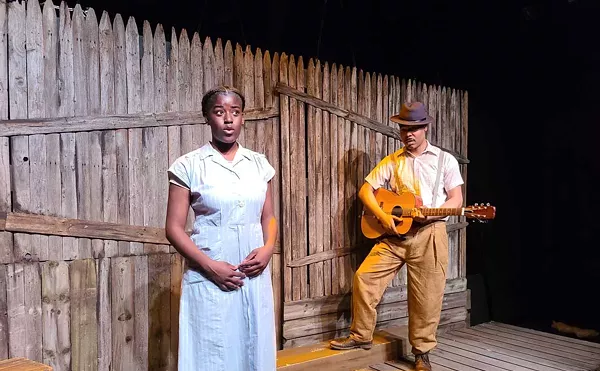
Audio By Carbonatix
[
{
"name": "GPT - Leaderboard - Inline - Content",
"component": "35519556",
"insertPoint": "5th",
"startingPoint": "3",
"requiredCountToDisplay": "3",
"maxInsertions": 100,
"adList": [
{
"adPreset": "LeaderboardInline"
}
]
}
]
If only fixing the world's woes were as simple as getting the right haircut or mastering the art of lip gloss. Though the makers of The Beauty Academy of Kabul are not quite that naive, some of the subjects of this documentary appear to be. The story of these beauticians without borders has a few moments that make you squirm as an American, but it's mostly a fascinating picture of women empowering other women, of a country trying to rebuild, and of cultures both clashing and coming together.
The cameras follow a cadre of posh New York stylists who set out to Kabul, Afghanistan, in 2004 to open a beauty school there. Several of the volunteer instructors are native Afghans who had fled to the United States and watched from afar as coups, the Russians and then finally the Taliban tore apart their homeland.
Via clips of '70s fashion shows, parties and cityscapes, Beauty Academy sets up what Kabul was — an international, metropolitan city with wealth, a Kabul most Americans probably don't know ever existed. Then we get the Kabul of 2004: ruins, rampant poverty and fear.
Director Liz Mermin introduces us to the students, women who survived the worst of the Taliban regime. They watched others get beaten and bloodied for having their hair styled, or showing a glimpse of skin. An entire generation was denied schooling — there's a 14 percent literacy rate among women in Afghanistan. And under the Taliban, women who provided salon services did so in clandestine quarters, always in fear of being discovered and punished.
The homecoming for the Afghan-Americans is bittersweet. "Sometimes I feel like I'm not even awake, it's just a dream," says instructor Sima Calkin, who left Afghanistan for the United States more than 20 years ago. Her students and the state of the city leave her humbled and devastated.
Sima and the other returning Afghan women come bearing the weight of guilt-heavy baggage. They also come, unfortunately, with a team of the flakiest, fruitiest American salon divas, the worst of whom chastises the students for not coming to class with a full face of makeup and for not sporting trendy hairstyles. "How can Afghanistan change if you don't change? You're stuck in a rut, guys," she says.
Um, shallow much? Never mind that some of these women still fear being seen as "whores" for disobeying their husbands; or that until just a few years ago, they were so terrorized that they'd panic when Talib men would knock at the doors of their home salons. (Often the men were just dropping off their wives in secret, the women say.)
"Since I was born, there's always been fighting," one young woman says. "If we talk back twice we are thrown out of the house," says another.
So we should blame them for not having five-color highlights and a full palette of MAC eye shadows? The New York women come from the business side of vanity; Vogue and other beauty industry stalwarts funded the entire project, so you can't expect too much depth.
If the Americans are annoying and narrow-minded, at least the Afghan women are inspiring. Their composure, gratitude, wit and resilience are amazing and captured well. We learn that the women in the school are now able to earn $40 a week, and some professionals in Afghanistan don't earn that much a month. Of course, their instructors can charge three times that for a cut and color back home, but no amount of mango-scented pomade in an American salon could ever make such a difference to so many women.
In English and Persian, with English subtitles. Showing at the Detroit Film Theatre (inside the DIA, 5200 Woodward Ave., Detroit), at 7 p.m. on Sunday, April 23, and at 7:30 p.m. on Monday, April 24. Call 313-833-3237.
Clare Pfeiffer Ramsey writes about film for Metro Times. Send comments to letters@metrotimes.com.





